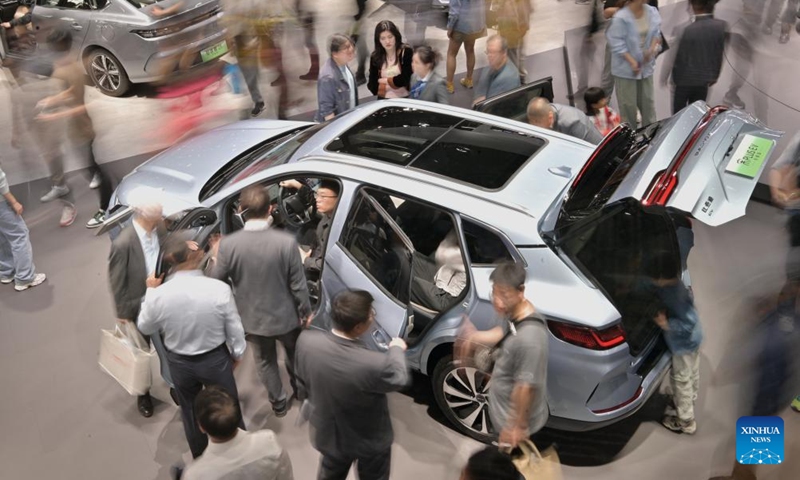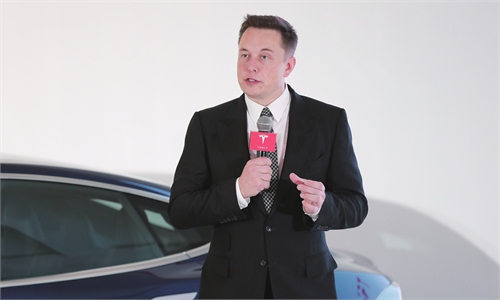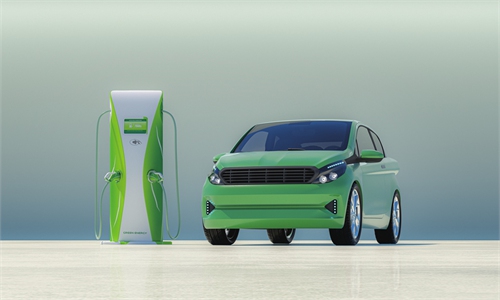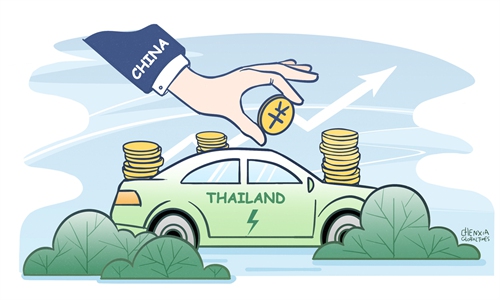US expert’s blunt call to ‘steal’ China’s EV technologies is of skewed mentality: observers

Visitors watch a vehicle of Song PLUS by Chinese NEV manufacturer BYD during the 2024 Beijing International Automotive Exhibition in Beijing, capital of China, May 4, 2024. Photo: Xinhua
While publicly acknowledging that the US electric vehicle (EV) industry is far behind that of China, an expert from a US think tank suggested recently that the US should attract Chinese EV makers to produce in America and "steal their intellectual property."
Chinese observers said on Tuesday that the blunt speech showed the warped thinking of the US in competition with Chinese enterprises, as the US always skews market competition and violates global principles to stymie China's emerging industries.
Observers warned that the US could hardly allow Chinese EV makers to invest in America in the short term, given the new tariffs imposed on Chinese EV imports by the Biden administration.
But some in the US may attempt to entice Chinese automakers with the ulterior motive of beating them in the US market and containing China's tech advance.
"I think the build-out of the EV industry in the US is far behind where China is right now," Jake Werner, acting director of the East Asia Program at the Quincy Institute, said during a recent seminar in the US, media outlet ifeng reported on Tuesday.
Jake Werner, who is the acting director of the East Asia Program at the Quincy Institute, urged the US to find a way to make sure that US automakers are competitive in the EV sector, given its importance to the future of the American economy.
"The best solution is to bring Chinese companies to produce in the US and then we should steal their IP," Werner said.
Li Yong, a senior research fellow at the China Association of International Trade, told the Global Times on Tuesday that Werner's speech reflects the unfair nature of China-US competition, since the US always skews market competition and violates global trade rules to contain China.
"Today, some in the US become even more shameless by not avoiding the word 'steal'," Li said. He said the US politicians' mentality is warped as the US finds it hard to accept the growing strength of China's EV industry.
Technological innovations, globally competitive industrial clusters, full-market competition and agile supply chains make China's new-energy vehicle (NEV) industry highly competitive in the global market, he said.
The Associated Press reported in May that BYD's electric car Seagull sells at merely $12,000 in China, but it drives well and is put together with craftsmanship that rivals US-made EVs that cost three times as much.
However, the rapid development of China's EV industry is driving some US politicians mad, as they see the Chinese EV industry as a major threat.
In May, US President Joe Biden directed the Office of the US Trade Representative to increase tariffs on $18 billion worth of Chinese goods, including EVs, lithium-ion batteries, semiconductors, solar cells, medical supplies, and some critical minerals and metal products. The largest increase applied to EVs, with tariffs rising from 25 percent to 100 percent.
Against this backdrop, Werner's call for attracting Chinese EV makers to invest in the US seems to be just a case of political posturing with ulterior motives, Huo Jianguo, a vice chairman of the China Society for World Trade Organization Studies in Beijing, told the Global Times on Tuesday.
The US will not allow Chinese companies to be more competitive than their US counterparts, he said. It is very likely that the US may aspire to attract Chinese EV makers to the US and "then beat them heavily in the US market," according to Huo.
"Protectionism does not nurture business champions. The fast-growing Chinese new-energy industries are what the world economy needs for the green transition. It serves the interest of China, the US, and the whole world.
"We urge the US to abandon its hypocrisy and double standards, and not make the same mistake of resorting to protectionism," said Wang Wenbin, a spokesperson for the Chinese Foreign Ministry, on May 14.



